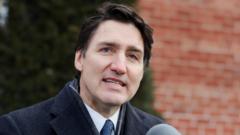Canadian Prime Minister Justin Trudeau has firmly rejected President Donald Trump's recent suggestion that Canada could be absorbed into the United States, stating that there’s "not a snowball's chance in hell" of that happening. Trump's comments about Canada potentially becoming the 51st state have stirred concern, especially as he threatened to impose significant tariffs on Canadian goods if security measures are not enhanced along the shared border.
During a press conference at his Mar-a-Lago estate, Trump suggested that the removal of the "artificially drawn line" between Canada and the US would enhance their national security. He reiterated that nearly C$3.6bn ($2.5bn) worth of goods and services cross the Canadian-US border daily, making it essential for both nations to maintain a robust trading relationship. Trudeau stated on X that both nations benefit greatly from being each other's major trading and security partners.
However, these economic discussions come at a tumultuous time politically for Canada. Trudeau announced his resignation, though he will remain as Prime Minister until a new leader from the Liberal Party is elected, a process expected to culminate by late March. Observers warn that Trump's tariff threats could pose severe risks to Canada's economy, particularly if action is taken after he assumes office on January 20.
In response to Trump's concerns about drug trafficking and border security, Canada plans to reinforce surveillance and establish a joint task force aimed at tackling organized crime across borders. Trump, while indicating he would not deploy military action to annex Canada, raised concerns regarding Canada's military expenditure, emphasizing that Canada's current budget falls short of NATO requirements.
British Columbia Premier David Eby and other provincial leaders are preparing to visit Washington D.C. to advocate against the proposed tariffs. Ontario Premier Doug Ford has urged Trudeau to collaborate with provincial leaders to effectively address Trump's economic threats. Ford, who underscored Ontario's deep economic interconnectedness with the US, emphasized that strong trade relationships should be prioritized rather than diminished, adding a humorous counter-offer to Trump's statehood comments regarding the purchasing of Alaska.
As the situation develops, both Canada and the US are left to navigate the complexities of their economic partnership and shared security interests under the looming pressures of a shifting political climate.






















